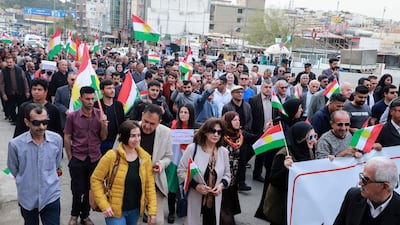The already troubled relationship between the ruling parties in Iraq’s Kurdistan region deteriorated further this week after an apparent Turkish drone strike near Sulaymaniyah airport on April 7, which struck near a convoy carrying Syrian Democratic Forces (SDF) commander Mazloum Abdi and US military officials.
It is another example of the enormous influence the actions of external forces have on the politics of the Kurdistan region and how local parties try to leverage those events for their own purposes.
In the hours after the attack, Kurdistan Regional Government (KRG) spokesman Jotiyar Adil released an incendiary statement against the Patriotic Union of Kurdistan (PUK), which governs Sulaymaniyah, calling it an “authoritarian party” whose behaviour had encouraged the Turkish attack.
Turkey shut down its airspace to flights to and from Sulaymaniyah in the days before the attack and accused the PUK of being under the control of the Kurdistan Workers’ Party (PKK), which has fought a decades-long conflict against Ankara for Kurdish rights and autonomy in south-east Turkey.
While nominally a government spokesperson, Mr Adil is a member of the Kurdistan Democratic Party (KDP), the PUK’s main domestic rival. At the moment, they sit in government together, but differences over internal revenue sharing, electoral reforms and security affairs have undermined their working relationship over the past year and a half.
Speaker of the Kurdistan Parliament Rewaz Fayaq, who is a member of the PUK, denounced Mr Adil’s statement. There was “no justification for the unlawful attack … just as there was none for any earlier attacks on Erbil airport,” she said, referring to repeated missile and drone strikes on the Kurdistan region’s capital over the past two years by Iran.
“The Kurdistan region's cities must be treated equally by the government. Shame on those who carried out the attack and anyone who justifies it,” Ms Fayaq said.
Zmkan Ali Saleem, a professor of politics at the University of Sulaymaniyah, told The National that the foreign ties of the Kurdish parties are mainly a function of the geopolitical ambitions and concerns of external actors.
“The Kurdish parties use external relationships for domestic political reasons, but that comes second,” Dr Saleem said. “The relationship is quite asymmetric.”
That has not stopped the KDP and the PUK from using their ties with foreign countries and non-state actors as fodder for their own rivalry, as highlighted by the anger over Mr Adil’s comments.
The KDP has a close economic, political and security relationship with Turkey, which maintains a network of military bases in the north-western parts of the Kurdistan region and Nineveh governorate. Ankara justifies this breach of Iraqi sovereignty as necessary to fight the PKK.
The KDP itself has clashed violently with the PKK several times in recent years.
Additionally, most of the Kurdistan region’s oil fields are in KDP-controlled areas with crude exported to the Turkish port of Ceyhan by pipeline. Before a recent arbitration ruling by the International Chamber of Commerce shut down operations, almost 370,000 bpd was sent via Turkey from Kurdish fields.
The PUK, in contrast, controls the Kurdistan region’s gas fields. KDP officials like KRG Prime Minister Masrour Barzani want to export this gas through Turkey as well.
PUK leader Bafel Talabani, the party’s relatively new leader, opposes those plans, arguing that Sulaymaniyah has not been getting a fair share of oil revenue, and that the PUK prefers a closer relationship with Baghdad.
In general, the PUK has strong ties with Iran and the parties that make up the ruling Co-ordination Framework parliamentary coalition in Baghdad. Militias associated with some of these parties have repeatedly attacked a Turkish base in Nineveh governorate.
Mr Talabani has also recently made a point of drawing a contrast with the KDP by emphasising his party’s links with Syrian Kurdish groups, which Turkey views as proxies of the PKK.
In a statement after the Sulaymaniyah airport attack, Mr Abdi said that Ankara was dissatisfied with “the recently strengthened brotherly relations” between the SDF and the PUK.
As the KDP and the PUK jockey for position in their internal rivalry and external forces use the Kurdistan region to advance their geopolitical interests, ordinary people are caught in the middle.
According to a report by Community Peacemaker Teams, cross-border attacks by the Turkish military killed between 98 and 123 civilians between August 1, 2015 and December 31, 2021 in Iraq’s Kurdistan region. Airwars has identified at least 15 civilians killed in Iranian cross-border strikes.
On July 20 last year, Turkish shelling killed eight tourists at a resort near Parakhe village in Duhok governorate. More than 20 others were wounded, including two of Yousif Saadi’s relatives.
Although his family has not left the area, Mr Saadi told The National that cross-border attacks have disrupted the local economy by preventing people from farming and grazing sheep.
“Many people from the villages are moving to the cities,” he said.
Other states also have significant interests in the Kurdistan region, including the US, the UK and European countries, who offer political legitimacy and security assistance to the KDP and the PUK, and Russia, whose state-owned energy companies have large investments in Kurdish oil and gas.
Nevertheless, foreign influences are controversial, even if they provide some benefits.
“As a citizen, I see all of it as negative,” Mr Saleem said. “I would like to see an institutionalised relationship where it’s not about these parties, their concerns, their domestic politics.
“Their survival should be routed through established institutions that work and operate on behalf of the interest of the Kurds,” he said.

